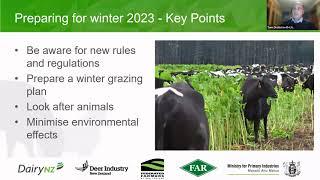Search results
Displaying 171 - 180 results of 1574
- Industry data… 14000 16000 18000 20000 0 0 0 202122 202223 202324 source beef lamb new zealand economic service new zealand meat board lamb …
- Other PDF… governments consultations proposed changes emissions … your own submission lnz has heard from many farmers concerned about whole farms being sold … integration trees farms outlined one recent reports 6 article provides good summary anne …
- Resource book… 35 farmers farmers beef lamb new zealand guide … new zealand cattle farming edited ken geenty consultant prof steve morris massey university … cattle annual rate pasture renewal has been reported just 23 compared 8 dairy cattle farms …
- … lamb, beef and wool exported globally by region. You can also use our interactive tool to … analyse meat exports by meat type, destination, season, or volume, value or average price, and …
- Industry data… 20000 25000 north asia south asia european union middle east north america north asia south asia european union middle east north america fine wool med … economic service statistics new zealand 202224season 202425 season wool exports region …
- User guide… 0800 beeflamb 0800 233 352 wwwbeeflambnzcom farmers farmers how find soil data smap 11 smaponline website smaplandcareresearchconz1 july … siblings category open pdf file showing soil report coordinates you have chosen you wish …
- External resource… trees farm decision support tool farmers contents … information scientific other result contained report neither plant food research nor any its … Trees for the farm …
- Video… grazing rules. The changes come into effect on 1 November 2022 and may impact decisions you are making on a farm now as you plan for winter 2023. Visit our dedicated winter grazing … grazing rules. The changes come into effect on 1 November 2022 and may impact decisions …
- News… + Lamb New Zealand (B+LNZ) is tracking data on farm sales for conversion into forestry as … more productive land. The latest independent report by Orme & Associates released today … The latest analysis of farm sales data confirms the increasing price of carbon in the …

- … wholesale land use change from sheep and beef farming to carbon farming that is incentivised by the Government. … This page sets out our position and there’s a list of our media releases at … clear – we are not anti-forestry. A lot of farmers are looking to integrate trees on …
